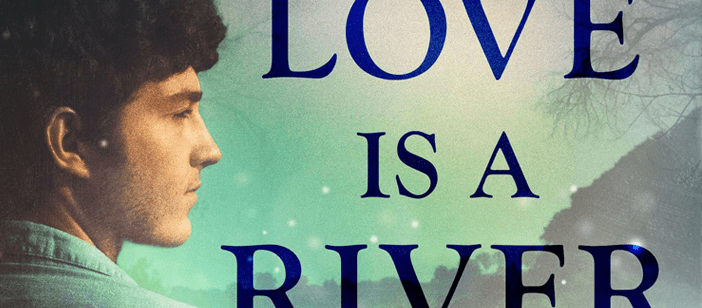“I already bought an old house on the bike trail by the Youghiogheny River, in Boston—Pennsylvania, not Massachusetts, of course. It’s only forty-five minutes away. We’ll remodel it and open an inn for people riding their bicycles long-distance from the Canadian border to Washington, D.C….”
From the Publisher: “Love dies with Abby’s father. The return of her mother after a twelve-year absence brings more grief. And the move to a dilapidated house along the Youghiogheny River bike trail is an exile.
When blond, blue-eyed Jack rides into Abby’s life, it’s like the sun has been restored to her world. Bit by bit, hints of a darker side to his personality appear. She struggles to deny them, even while her best friend, Morton, grows increasingly mistrustful of the handsome stranger.
Abby uncovers a mystery from the Civil War era in a nearby cemetery, which brings her only moments of peace. Cool caresses and the whispered call, ‘Abigail…’ send her digging into the past.
But as Jack’s motives become ever more unclear, the love Abby hoped for seems impossible. And leads her to a life or death choice. Will love be her salvation… or her demise?”
About the Author: Local author Laurel Houck has published magazine pieces with Westsylvania, Skipping Stones, Nuances, and The Loyalhanna Review and her newspaper articles have appeared in The Pittsburgh Post-Gazette and The Niagara Advance. When not writing, she travels the world as a medical missionary (for more about Laurel’s international missions, check out this recent profile in the Pittsburgh Tribune-Review). You can also read an excerpt from her previous book, The Girl with Chameleon Eyes, right here on Littsburgh!
For more about Laurel, visit her website or connect on Instagram, Facebook, and Twitter!
Chapter One
 “Where else am I supposed to go?”
“Where else am I supposed to go?”
Not expecting an answer, Abby inhaled a lingering hint of her father’s citrus sweetness that hovered over the persistent stench of his death. Her wandering gaze took in the things he had loved—Civil War mementos crowded on the mantel, shelf, and curio cabinet.
“I get it.” Her mother put her hands on her hips. “You don’t want to move. But your grandmother went back to Florida. Fifteen is too young to stay here alone. That leaves us together.”
Her words were bullets—quick, brutal, and painful.
Sorrow and fear wound through Abby’s heart like laces in an old boot. She glanced at the date on her phone. Could this be her mother’s lame attempt at an April Fools’ Day joke? “Dad’s only been… gone… for two months.”
“It must have been hell watching your father suffer.” Her mother sighed. “But I’m back. You have to trust me.”
Abby considered the thin stranger across the room. Obviously, she was serious. Should she give her a chance? Did she have a choice? She forced words around the tightness in her chest. “I miss him so much. Living here is what helps the most. Seeing his garden, sleeping in the room we painted together—pieces of him that are part of this house. I need more time.”
Her mother looked at the floor. “Staying here isn’t an option. We had a serious buyer come through the house this morning; I accepted their offer. They put down hand money. Their loan has already been approved.” She stared at the floor. “Consider this place sold.”
Abby gasped, total disbelief ballooning into white-hot anger. “Sold? What happened to trust, to sharing, to your little ‘take all the time you need to heal’ crap? Dad would never have done this to me if you had died.” The poison of her mother’s twelve absent years roiled at the bottom of her stomach.
Racing to the bathroom, Abby held her long blonde hair back with her right hand while she threw up in the toilet. She flushed the residue of her peanut butter and jelly sandwich, wet the corner of the hand towel, and wiped her face. The bright red zit on her forehead and the smeared mascara under her blue eyes brought out a frown.
Her mother walked in, brushed a lock of flaxen hair out of Abby’s face, and grazed the soft flesh on Abby’s cheek. “A new start will be good for us. I am your mother.”
Abby flinched. “Seriously, Lisa? You haven’t been my mother for way too long.”
Her mother frowned. “I prefer to be called Mom, if you don’t mind.”
“‘I prefer.’” Abby grimaced. “It is all about you, isn’t it? Turns out I do mind.”
Abby crossed her arms and waited. After too many years of wishing for a mom, the time to welcome this one back had passed.
Lisa sighed. “Okay. I won’t fight that battle with you right now. It’s more important to focus on finding our way back to each other.”
“It’s going to be a long trip. You don’t know me.”
“Of course I do. You’re my daughter.”
“Right.” Abby pulled the phone from the back pocket of her jeans. “What’s my favorite music?”
Lisa paused. “I’m guessing Disney princess songs would be wrong.”
“Ya think?” Abby took a deep breath. “My best friend, my only friend, moved to Oregon in January. You never met her. Can you make my favorite dinner? Nope, because you have no clue what I eat. I hate exercise, math, ghost stories—and you. Now you know something about me. Feel connected?”
Lisa’s voice caught. “I love you. It’s him I left.”
“Funny thing about that. When you left him, I got left behind, too. No calls, no visits, no nothing.” Abby stalked to the kitchen, shuddering at the anger pulsating through her but unable to make it stop. Pulling a bottle of water from the refrigerator she downed half of it, choking when her mother followed.
Abby swiped dribbles of water off her chin with her fist. “After twelve years, I’m over you. But even when Dad got sick you stayed away.” She jabbed a chewed fingernail at Lisa. “You—stayed—away.”
Lisa ran trembling fingers through her already-tousled bob. “You have to believe me. I had a good reason to leave.”
“What’s your ‘good reason’ for dumping us?”
Lisa pulled a kitchen chair away from the table, sat down, folded her hands, and lowered her head. “It doesn’t matter anymore.”
Abby longed to tell her that everything would be fine and to accept a big mom-hug. Instead, she wrapped her own arms around her body, fingertips pressing into bony ribs. “Did you ever wonder about me, even once? If I liked ballet or baseball? If I was short or tall? If I lived or died?”
Lisa opened her mouth and then shut it.
“You already decided to move back to Pittsburgh.” Abby tamped down her anger and went for reasonable. “If we stay in this house we can bond here.”
In the moment of silence that followed, a brief twitch of hope tickled Abby’s gut.
“I can’t live here,” Lisa said at last. “Memories that are precious to you are ghosts that keep me tied to the past. I know you loved your dad. I’m sorry he died. But my life isn’t inside these four walls anymore. Neither is yours.”
Abby’s stomach gurgled, as if begging to hug the toilet bowl again. The cool porcelain would almost be a relief next to her burning cheeks. “It’s hard to believe how understanding you are, Mother. I won’t let go of my dad.”
“Let go? It’s not like I’m asking you to forget him. Just take a step back and loosen your grip, that’s all.” Lisa shrugged. “It may even help you to get over it.”
A raging heat crept over Abby. “It? I’m not getting over him like some virus.”
She turned away and ran her hand across the butcher-block kitchen counter, ending at the stove. Plucking a griddle off the shelf, she banged it on the burner. “This is where Dad made chocolate-chip pancakes, every Saturday morning.” She closed her eyes. With very little effort, the sizzle of batter, the mingled aromas of chocolate and butter, and the light flap of a turned pancake drifted through her mind.
Leaving the kitchen, Abby stalked across the great-room past the stone fireplace, Lisa following. “I remember being four years old. Dad built a fire and danced with me during a thunderstorm; storms never scared me again.”
She gestured up the stairs. “Dad’s bedroom is up there. He died in that room, holding my hand, not yours.” Silent tears coursed down Abby’s pale cheeks, as she realized leaving his house would be as if she were losing him all over again.
“I refuse to play the guilt game.” Lisa once again put her hands on her hips. “I’ve been more than patient. When your grandmother left in March, I came to help you work things out. When that didn’t happen, I gave you space. I’m not sure where you thought things were heading, but I guess I didn’t explain myself clearly enough. What part of ‘you’re moving’ don’t you understand?”
Silence stretched between them, broken only by the ticking of the antique mantle clock. They stared at each other; Abby’s mother looked away first.
“Lisa?”
Silence.
“Mom?”
More silence.
Screw her. “Are we moving to a cardboard box under the Liberty Bridge or a homeless shelter?”
Lisa stared at a point above Abby’s head. “I already bought an old house on the bike trail by the Youghiogheny River, in Boston—Pennsylvania, not Massachusetts, of course. It’s only forty-five minutes away. We’ll remodel it and open an inn for people riding their bicycles long-distance from the Canadian border to Washington, D.C. I’ll drive you to your old school until the end of the year.”
“So, let me get this straight. We move to a total dump in a tiny town no one ever heard of, slap on some paint, heat up microwave pancakes, and make a fortune from people on bicycles?”
Abby’s anger seeped away like murky dishwater oozing down the kitchen drain; the sludge of grief and disappointment remained. “It’s a done deal?”
Lisa nodded and reached out to hug her. “Abby—please …”
Abby pushed her mother away. “Fine. Whatever. Leave me alone.”
She retreated to the kitchen once more and waited until Lisa’s footsteps faded, cringing at even the murmur of her shoes on the carpeted stairs. “Why did you do this to me, Dad? What am I supposed to do without you?”
The blue gingham curtain rustled in a sudden draft of cool air that wafted through the partially open window above the sink.
“Abigail …”
Abby thought she heard someone whispering her name, carried by a breeze that smelled like campfires and coffee. “Dad?” But he always called her Abby. Were things different in heaven?
Rubbing the goose bumps on her arms, she took a few halting steps and looked out the window. No one was there. The sound should have been frightening, ghostly, freaky to the max. Instead, she found it oddly calming, as if her name had been murmured with love. Blinking her burning eyes, she gazed out at her father’s garden. The birds still chirped, and the pansies remained fragrant. In the clear, cerulean sky, the sun shone bright, warm, perfect.
How could everything outside be so predictable and normal, while everything inside spun out of control? A stray cirrus cloud drifted across the sun. Abby pressed her palm against the warm glass. Nothing would ever be the same. Ever.
This excerpt from Love is a River by Laurel Houck is published here courtesy of the author and should not be reproduced without permission.

























